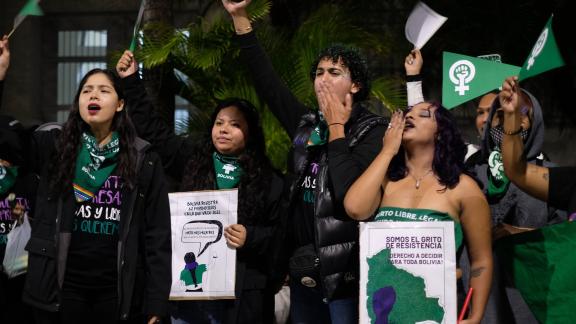Election season is heating up. As headlines in the U.S. swirl with updates about presidential campaigns, pop star endorsements, implications for our democracy, and of course, for abortion rights, it is easy to forget that the United States is not alone. Ours is but one of at least 64 national, presidential, or parliamentary elections that will take place this year, with half the world’s population heading to the polls. That makes 2024 the biggest and most consequential global election year in history.
A consequential global election year.
From Taiwan to Russia and from Malawi to France, each election will have significant implications for human rights, including women’s rights. It is fair to say that around the world, bodies are on the ballot.
When it comes to the global movement for bodily autonomy, progress can look very different around the world. In some countries it can take the form of pro-abortion legislation, while in others it can be as basic as acknowledging that women have a right to make decisions about their own bodies. Regression, on the other hand, looks the same in every country: it looks like the far right. The political climate leading up to elections in several countries, including the U.S., has demonstrated a troubling resurgence of support for far-right parties and other anti-rights groups. This was especially true of the parliamentary elections in Europe earlier this year. Far-right parties made huge gains across all 27 member states, including Germany, Spain, and the Netherlands. In France, a stunning 38% of votes were cast for far-right parties.
The U.S. is a bold participant, perhaps even an agitator, of this global far-right resurgence. We are all too familiar with the regressive, anti-immigrant, anti-trans, anti-reproductive-freedom, and anti-progress rhetoric that is characteristic of a far right campaign. But one important thing sets our election apart from others experiencing similar stakes: The U.S. 2024 election has the power to impact the bodily autonomy of people around the world—not just those within our borders. And that’s because of a policy called the “Mexico City Policy,” also known as the Global Gag Rule.
when
country
United States
region
Americas & the Caribbean
Subject
Abortion Care
The U.S. is a bold participant, perhaps even an agitator, of this global far-right resurgence.
The world is watching what happens in November.
Because the United States is a leading funder of global health programs, it has the power to make a tremendous impact on people’s sexual and reproductive health and rights (SRHR) — positive or negative. Restrictions on funding that target abortion care internationally have had broad, detrimental impacts on reproductive health care systems and outcomes. The Global Gag Rule is a policy that threatens to discontinue U.S. funding to nongovernmental organizations around the world that provide or promote abortions.
Since it was first created in 1984 under Ronald Reagan, the Global Gag Rule has historically been put in place by Republican presidents and rescinded by Democratic ones. The Trump administration massively expanded the Global Gag Rule to apply to 20 times as much funding as it had under previous Republican administrations.
The impacts of this expansion were devastating. By one estimate, 8 million women lost access to SRHR during Trump’s term, resulting in 6 million unintended pregnancies and 1.8 million unsafe abortions.
If elected again, Trump would expand the Global Gag Rule even further—effectively putting it on steroids. Family planning providers say that if Republicans win again in November, cuts to service availability will be very stark. Project 2025, the policy agenda created by conservative activists and spearheaded by The Heritage Foundation, envisions a vast expansion of the Global Gag Rule, which family planning providers across the world warn threatens abortion rights worldwide—even in countries where it is currently legal. For many NGOs, even mentioning the word abortion would jeopardize U.S. funding and their work, and for many non-profits, their very existence.
If elected again, Trump would expand the Global Gag Rule even further—effectively putting it on steroids.
President Biden scrapped the Global Gag Rule in 2021, one week after he was inaugurated as president, in a move celebrated by health groups around the world including IPPF. With the power of an executive order, Biden restored the United States’ commitment to women’s and girls’ health and rights around the world. Since then, global health organizations like IPPF and its Member Associations have been free to offer comprehensive reproductive care without fear of losing vital funding. If Vice President Harris is elected in November with a favorable Congress, they may even have an opportunity to end the Global Gag Rule for good.
Of course, domestically, the consequences of Trump’s presidency on reproductive health and rights have been deeply felt and widely known. The overturning of Roe v. Wade and rapid banning of abortion in nearly half the United States has put all people with the capacity for pregnancy at great risk. What’s less obvious is the impact this regressive administration had on SRHR the world over — and just how much is at stake for women globally if Trump takes the White House again.
By the time 2024 ends, half the world will have voted in national elections. While we can’t foretell the outcomes yet, we know one thing for sure: the world will look different in 2025. Now is the time to do everything in our power to ensure the direction we take is a path toward sexual and reproductive freedom—not just for people in the U.S., but all over the world.











